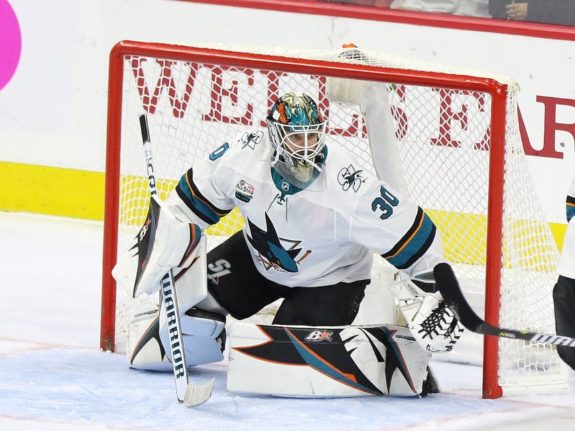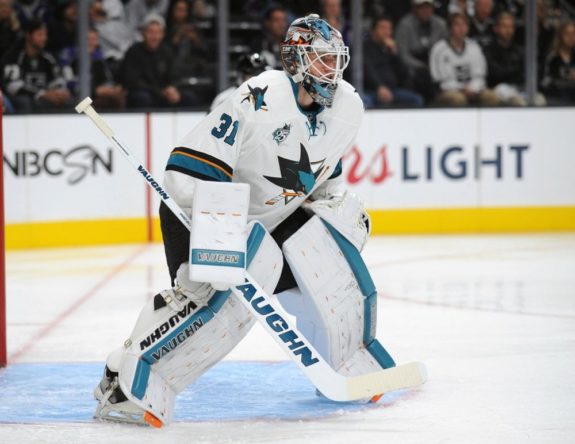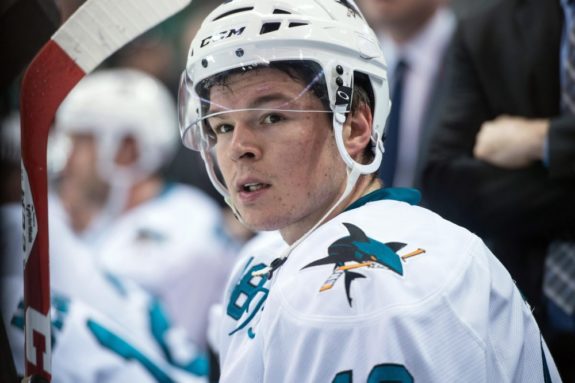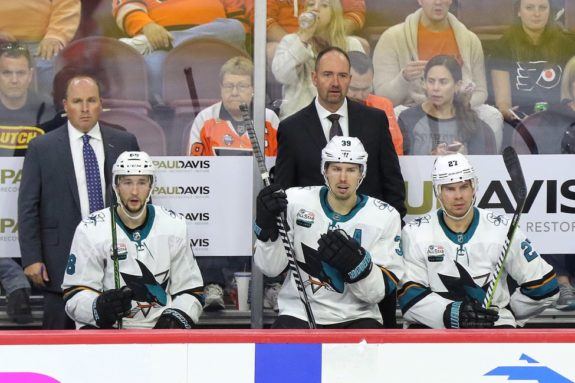In my prior piece, I laid out the four things the San Jose Sharks need to do to meet the high expectations set out for this powerhouse roster. Since then the Sharks have played three games, losing to the Dallas Stars 3-2, then beating the Arizona Coyotes 5-3 and the New Jersey Devils 5-2.
We’ll take a deeper dive into these four keys, two offensive and two defensive, and see how they impacted these three games. The keys are all things this team is capable of doing. They play to the team’s strengths and do not ask them to go outside of their abilities. We’ll show how these keys can change the Sharks from a playoff contender into one of the league’s top teams.
Key 1: Sharks Goalie Play
Getting better net play from their goalies begins the list. Martin Jones had a very disappointing start to the season, but he may be back on track. Maybe. In his last two games, he’s has been better, but still allowed soft goals. One played a major role in the Sharks loss in Dallas. Against Arizona, Aaron Dell took the nets and didn’t allow a soft goal. In this game, Dell was greatly aided by the Sharks defense which allowed only 20 shots on goal.

Jones returned to the nets against New Jersey. He gave up a very soft goal to open the scoring, but as happened against Arizona, the defense in front of him was strong and he allowed just one more goal the rest of the way.
Key 2: Eliminating Opponents’ Odd-Man Rushes
The Sharks also need to make a major commitment to preventing odd man rushes and breakaways by their opponents. In the game against Dallas, the Sharks went the first 35 minutes without allowing a breakaway or an odd man rush. And the Stars didn’t score. Alas, a poor change by the defensive pairings led to a Stars breakaway and their first goal of the night against Jones. The Stars’ third goal also happened on an odd man rush; it proved the game winner. I counted four of these rushes in the game, all in the last 25 minutes.

Against the Coyotes, the Sharks did an excellent job of preventing odd man rushes, perhaps their best outing of the season to this point. On one near breakaway, the Coyotes’ Richard Panik was able to get to point blank range before a Sharks defender could influence play. It was too late, and Panik provided Arizona with its third goal.
The Sharks were good against the Devils, not allowing odd-man rushes and therefore, no scores off odd-man rushes. Two games in a row of not allowing odd-man rushes is a good sign for the Sharks.
The Sharks’ Defensive Keys
Against Dallas, the Sharks allowed two odd-man rush scores and one soft goal – which comprised all the Stars’ scoring. Which is to say, if the Sharks did what they must do to turn things around, they’d have pitched a shutout in Dallas. Against Arizona, a near-breakaway provided one of the three goals. Against the Devils, Jones gave up a soft goal. In the three games, five of the eight goals fell into one category or the other. The Sharks gave up just three other goals in three games. It turns out, the Sharks are very stingy when they don’t give up easy scores. And a stingy Sharks team will be successful. When the Sharks give up two or fewer goals in regulation, their record is 10-0-1.
Key 3: Sharks Behind the Opposing Net
The third area the team needs to improve on is taking the puck behind their opponent’s net and using their power forwards to work this area.
These days, NHL teams struggle to score if an opponent gets their defense set; more goals are scored on quick strikes, often coming off odd-man rushes. The Sharks are not a particularly fast team – a ‘track meet’ style of play will leave them at a disadvantage against several of the league’s better teams. A game with few fast breaks by either team will play to the Sharks’ strengths, provided they are more efficient with the rest of their 5-on-5 time with the puck. Taking the puck behind the net and running the offense from there is the most efficient way for the Sharks to run their 5-on-5 offense.
Behind-the-net play is one of the few places the Sharks can increase their 5-on-5 scoring and, just as importantly, draw penalties. The team needs to get religion about this. It is a tough place to play, but the payoff is real and the team is built for this. No other team has a trio of power forwards as good as San Jose’s group of Timo Meier, Evander Kane and Tomas Hertl. They have several other forwards who are effective behind the net. And when the spirit moves him, defenseman Brent Burns is as tough to handle down there as any player in the league.

There aren’t many defensemen who can handle these Sharks behind the net, shift after shift. Over the course of a game, the Sharks can create lot of mismatches. The team needs to do less cruising through the area behind the net and bumping the puck out to the point for their defensemen. They need to let their powerful forwards work behind the net instead. This scrambles defenses, draws penalties and creates high quality scoring chances.
Against Dallas, the Sharks rarely played from behind the net. They did draw one power play from that area, but it wan’t nearly enough. Against Arizona, once again, the Sharks still didn’t take the puck behind the net often enough. But first-year forward Lukas Radil did late in the third period and the resulting goal broke a 3-3 tie and proved to be the game winner. The Sharks had some terrific scoring chances coming off play behind the net against the Devils. This included a wide open net (with the goalie down) from just outside the crease, but the shot sailed high.
Key 4: Sharks’ Power Play
The Sharks need to produce more on the power play, and there are two parts to this. They need to get more power plays and they need the power play to be more effective. Recent play is encouraging on one front, with the Sharks converting on seven of their last 20 power plays (35 percent). This has lifted them to ninth overall at 23.2 percent efficiency. But the league-leading Colorado Avalanche are at 30.2 percent.
The Sharks are 20th in power-play chances per game at 3.1. The league-leading Florida Panthers draw 4.0 per game. In their last 13 games, San Jose has gotten three or fewer power plays 11 times. It isn’t good enough. In the three games against Dallas, Arizona and New Jersey combined, the Sharks drew only five penalties total and scored once, with the one goal coming against the Devils (to be fair, the officials could have called a lot more penalties in that game). When the Sharks collect four or more power play opportunities in a game, their record is 6-2-0.
The Sharks should be among the league leaders in drawing penalties and among the leaders in power play efficiency. Last season, they went on a tear in the middle of the season, scoring 24 power play goals in 21 games. The streak ended the game Joe Thornton suffered his knee injury. Well, Thornton is back and Erik Karlsson has joined the party. No team rolls out more power-play talent than the Sharks. So far this season, the Sharks are averaging 0.72 power play goals per game. Two teams are averaging more than a power-play goal per game and two others average above 0.90 goals per game. This is the company the Sharks need to keep.

The Sharks are a team capable of winning big on special teams. Last season, they led the league in special teams goal differential. This season, the penalty killers are doing their part, the power play, not so much.
The Sharks’ Offensive Keys
The Sharks two offensive keys complement each other. Taking the puck behind the net gives a lot of defenses trouble and will aid the Sharks modest 5-on-5 scoring. It also wears down opponents, creates more passing space in the offensive zone and critically, leads to more penalties. In the games the Shark have generated four or more power plays, they are 6-2-0. This is a team capable of joining the league’s elites at around 1.0 power play goals per game. At this level, opponents will be fearful of taking penalties, which can make them less aggressive. There is value everywhere in this equation.
Can the Sharks Become an Elite Team?
The Sharks were denied a goal in Dallas by the “intent to blow the whistle” rule and in a one-goal game, losing a goal is a big deal. It is also the Sharks lone loss in the last five games. Thing is, the competition has been pretty modest in these games; only Dallas sits in a playoff spot. The Devils, who the Sharks dismantled for their most recent win, had won just one of their last ten games. The Sharks play has improved, but we’ll know more when the competition steps up a few notches. Head coach Peter DeBoer has adjustments to make if the Sharks are to be what they are expected to be.

The bottom line is simple: improved is simply not good enough. The team needs to be elite with puck play behind opponent’s nets, on the power play, in drawing penalties and in preventing odd-man rushes. To do this, the Sharks need only play to their strengths. Martin Jones has never been an elite goalie, and the Sharks don’t need to him to be elite. Somewhere in the top ten the rest of the way would be fine.
The Sharks are very capable of doing these things. If they do, their record will reflect it and they’ll become one of the league’s elite teams. If they don’t, well, their record will reflect that, too.